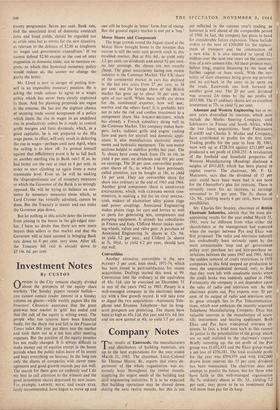Company Notes
THE results of Eastwoods, the manufacturers and distributors of building materials, are up to the best expectations for the year ended March 31, 1961. The chairman, Lieut.-Colonel • Sir Thomas Moore, Bt., reports that every de- partment of the whole organisation was ex- tremely busy throughout the twelve months supplying the urgent needs of the building and civil engineering industries. It is to be expected that building operations may be slowed down during the next twelve months, but this is not yet reflected in the current year's trading, as turnover is well ahead of the comparable period of 1960. In fact, the company has plans in hand for considerable future expansion. These include orders to the tune of £300,000 for the replace- ment of transport and the construction of a new kiln. It is also intended to spend £21 million over the next two years on the construc- tion of a new cement kiln. All these projects may, before long, require financing by the issue of further capital or loan stock. With the cer- tainty of slum clearance being given top priority and no cut-back in the sums to be spent on the roads, Eastwoods can look forward to another good year. The 20 per cent. dividend was covered 2.6 times by the net profits of £655,908. The £1 ordinary shares are an excellent investment at 77s. to yield 5f per cent.
Adamant and Western Engineering has in re- cent years diversified its interests, which now include the Marles Steering Company, steel fabricators in France and South Africa, while the two latest acquisitions, Steel Fabricators (Cardiff) and Charles S. Madan and Company, have contributed to profits for the first time. Trading profits for the year to June 30, 1961, were well up at £728,514 against £511,089 and produced a net profit of £268,253. A revaluation of the freehold and leasehold properties of Western Manufacturing (Reading) disclosed a surplus of £911,025, which has been placed to capital reserve. The chairman, Mr. F. G. Matravers, says that the dividend of 15 per cent. could have been' more had it not been for the Chancellor's plea for restraint. There is certainly room for an increase, as earnings amounted to 33 per cent. The 5s. shares at 12s. 9d., yielding nearly 6 per cent., have future possibilities.
Mr. Charles Orr Stanley, chairman of British Electronic Industries, admits that the most dis- appointing results for the year ended March 31, 1961, were far different from what either the shareholders or the management had expected when the merger between Pye and Ekco was first proposed. The radio and television industry has undoubtedly been seriously upset by the most unreasonable `stop and go' government policy over purchase tax and hire-purchase re- strictions between the years 1947 and 1961. After the sudden removal of credit restrictions in 1958 companies in this field stepped up production to meet the unprecedented demand, only to find that they were left with unsaleable stocks when the credit brake was suddenly applied in 1960. Fortunately the company is not dependent upon the sales of radio and television sets. As the chairman points out, Pyc exports over 50 per cent. of its output of radio and television sets; its great strength lies in Pye Telecommunica- tions, which now embraces the recently acquired Telephone Manufacturing Company. Ekco has valuable interests in the manufacture of scien- tific instruments and heating appliances. Both Ekco and Pye have widespread overseas in- terests. In fact, a brief note such as this cannot do justice to the potentialities of the group, which are so well outlined in the chairman's report. Briefly summing up, the net profit of the Pve group was £1,032,435 and the Ekco group made a net loss of £356,181. The total available profit for the year was £594.939 and with £162,000 drawn from reserves the 15 per cent. dividend has been maintained. The chairman does not attempt to predict the future. but for those who have faith in this well-managed organisation the 5s. ordinary shares at 10s. 3d., yielding 7.2 per cent., may prove to be an investment that will more than pay for its keep.














































 Previous page
Previous page